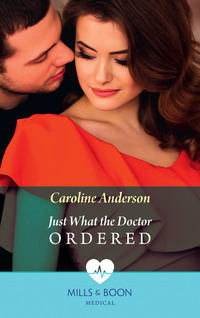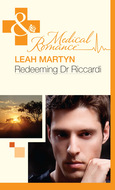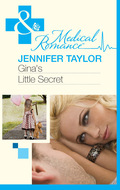Książki nie można pobrać jako pliku, ale można ją czytać w naszej aplikacji lub online na stronie.
Czytaj książkę: «Just What the Doctor Ordered»

Just What the Doctor Ordered
Caroline Anderson

MILLS & BOON
Before you start reading, why not sign up?
Thank you for downloading this Mills & Boon book. If you want to hear about exclusive discounts, special offers and competitions, sign up to our email newsletter today!
Or simply visit
Mills & Boon emails are completely free to receive and you can unsubscribe at any time via the link in any email we send you.
Table of Contents
Cover
Title Page
Chapter One
Chapter Two
Chapter Three
Chapter Four
Chapter Five
Chapter Six
Chapter Seven
Chapter Eight
Chapter Nine
Chapter Ten
Copyright
CHAPTER ONE
IT WAS a typical little Cotswold town, the broad main street lined with pretty little houses and shops of pale honey-coloured stone, liberally sprinkled with tearooms and antiques shops, with here and there a timber-framed Tudor house jutting out precariously over the pavement.
Following the directions in the letter, Cathy drove past the old stone market hall with its broad open arches and then turned right over the river.
There, just where she had expected to find it, was a sprawling stone-built house with a car park beside it, and a large sign that read, ‘Barton-Under-Edge Surgery’. As Cathy turned the car into the surgery car park and switched off the engine, she felt a sudden, unexpected rush of nerves.
Ridiculous! She chided herself. Either you get the job, or you don’t. It’s not as if you’re out of work! It really doesn’t matter at all…
But it did, because in driving through the little town she had fallen irrevocably in love, and her bruised and saddened heart had felt suddenly at home. And so it did matter, quite enormously, that she should succeed.
She swivelled the rear-view mirror round and peered at her reflection, checking that her wild tangle of red-gold hair was still confined in the rather severe bun at the nape of her neck, that the soft green shadow which so exactly matched her eyes hadn’t creased, that the heat of the day and the effect of her suddenly rebellious nerves hadn’t smudged her mascara or made her ridiculously tip-tilted nose shine, although nothing in the world could rid it of the hated freckles.
Her lips still bore the trace of the soft pink lipstick she had applied earlier, and she was torn between appearing over-casual or touching it up, risking giving the impression of being over-glamorous. She settled for a quick swipe and a dab with a tissue, then, wiping her suddenly damp palms on the tissue, she stepped out of the car and pulled on her lightweight jacket. Drawing a deep, steadying breath, she made her way into the surgery.
The reception area was deserted except for a few escapee toys. She rang the bell, and, while she waited, she picked the toys up out of habit to return them to the box in the corner. As well as half an armful of bricks and blocks, there was a squeaky rabbit, grubby with much use, and a frayed old rag doll that must have been dearly loved in her past. Cathy smoothed back the tangled woollen hair with a wistful smile.
‘Can I help you?’
The deep voice, so unexpected in the silence, made her jump and she squashed the rabbit, making it squeak.
‘Sorry, you startled me!’ she said breathlessly, and turned, flustered, to find herself face to face with a tall, fair-haired man. His physique was impressive, his shoulders filling the doorway, but it was his eyes that drew her, eyes that seen against the golden bronze of his tan were the most astonishing blue she had ever seen.
‘I—I’m Dr Harris—I have an interview with Dr Glover at three o’clock.’
He held out his hand. ‘Max Armstrong—I’m his partner.’
She hesitated, juggled the toys into one arm and extended her own hand. His handshake was firm, brief and positively electric. Startled by the sudden warmth that flooded up her arm, Cathy loosened her grip on the bricks and they cascaded to the floor again.
‘If you’ve finished with the toys, perhaps we should put them back in the box and proceed with your interview?’ he said with a laughing smile, and the smile transformed him from plain old attractive into the most devastatingly good-looking man she had ever seen. Her heart kicked against her ribs, and she frantically put it down to interview nerves.
‘We’re on the run this afternoon, I’m afraid,’ he explained as he straightened, his hands full of blocks, and tossed them into the toy-box. ‘I’ve been on holiday and there’s a hell of a backlog as usual—here, let me help you.’
He scooped the remaining toys out of her arms, and she drew in her breath sharply as his hands brushed casually against the fullness of her breasts. Her heart jerked again, and as she looked up into those gorgeous blue eyes she could see a devil dancing in them.
‘Sorry,’ he murmured, but she had the distinct feeling he wasn’t. Swallowing her confusion, she stooped and picked up the last of the toys and returned them to the box hastily, then followed him through a doorway to the kitchen at the back.
Her heart was still in turmoil from the look in his eyes and the unexpected touch of his hands on a body long condemned to abstinence, and so she was relieved to see that the other man in the kitchen was much older, perhaps in his fifties, a gentle, kindly looking man with crinkles round his eyes, a slight paunch and a straightforward, no-nonsense handshake.
‘Dr Harris—welcome to Barton-Under-Edge. You’ve met Max, I take it? Sorry about the kitchen, but we’re on the drag and as we’ll probably be working till seven tonight we ought to grab a bite. Have you had lunch?’
‘I have, thank you. And please don’t apologise. I know all about eating on the run!’
‘I’m sure you do. Coffee, then?’
He poured her a cup from a jug on the machine, and she sipped it gratefully while they unwrapped some pre-packed sandwiches. Her application was lying on the table, a coffee-coloured ring on it, and Dr Glover flipped it across the table to his colleague.
‘Here, perhaps you could skim your eyes over that while we get to know each other.’ He smiled at Cathy. ‘So, Dr Harris, tell us about yourself.’
‘Of course.’ Lord, she hated those sorts of questions! She cleared her throat and sat up straighter. ‘Well, until recently I’ve been working part-time in an inner-city practice, but the practice has expanded due to redevelopment, and they want a full-time partner so I’ve been filling in, but I didn’t think I wanted to work there full-time permanently, so I thought I’d have a look and see if there was anything more suitable.’
Oh, lord, I’m gabbling, she thought, and paused for breath. Dr Armstrong looked up from her application, those blue eyes sweeping her with blatant curiosity. ‘You’re thirty-five? You don’t look it.’
She gave him a sugary smile. ‘I dye the grey.’
‘Amazing, it looks so—natural …’ He seemed to inspect her hair for a second, and then glanced back, his eyes sharp behind the friendly twinkle. ‘And yet, despite your—’ one eyebrow arched provocatively ‘—advanced years, you’ve only been working part-time?’
‘Until recently, yes,’ she confirmed.
‘You do know this is a full-time post?’
‘Yes, I do. I want full-time now.’
‘So why not stay on where you are? Personality problems?’
Not until I met you, she wanted to say, but bit her tongue. ‘I don’t want to work in an inner-city practice.’
‘Too much for you?’ he asked, and she sensed rather than saw the sudden shift in his attitude. Gone was the friendly smile, the mild flirting, and she felt oddly threatened.
‘I thought the country air and the simpler lifestyle would benefit my son. He’s just started school, and frankly I’m not happy about it. I thought a country school would suit him better.’
The atmosphere chilled even further. ‘Son?’
‘Dr Harris has a son of five,’ Dr Glover put in. ‘Stephen, isn’t it?’ His smile was encouraging.
‘That’s right.’
‘Just the one?’ Dr Armstrong asked, and she nodded.
‘Why on earth do you want to work full-time?’ he asked, his voice deceptively lazy. ‘Wouldn’t you rather be at home tweaking the curtains and patting the cushions?’
Cathy controlled her temper with difficulty. ‘As a matter of fact I wouldn’t, but even if I would I don’t have the choice. If I want any kind of a lifestyle, I have to earn it.’
‘Ambitious, eh?’
‘No more than any other caring parent,’ she said quietly.
He eyed her dispassionately. ‘I would have thought you’d be more than happy to allow your husband to make all the pushy career moves. How does he feel about a move to the country—or do you support him, too?’
A long-ago sadness touched her gently. She was dimly aware of Dr Glover’s sharply indrawn breath, but she ignored it. ‘Not any more—Michael died three years ago. He had multiple sclerosis.’
She looked down at her hands, but not before she saw the swift shock on Dr Armstong’s face.
‘I’m sorry,’ he said quietly, and his rich, deep voice was tinged with remorse. ‘I had no idea. I haven’t really had time to study the applications.’
She lifted her eyes to his, unwilling to use her late husband as a defence against Dr Armstrong’s blistering interview technique. ‘Please—forget it. It really doesn’t matter.’
‘But it does—in many ways, in fact, I think it’s even worse than if you were married,’ he argued, and she could see now there was no light-hearted twinkle or mocking humour. He was deadly serious. ‘You’ll have no back up, no emotional support—it’s a hard life, demanding, the hours are long and antisocial, they don’t coincide with school holidays—there are endless insurmountable problems.’
‘Not entirely insurmountable,’ she corrected quietly, ‘and believe me, I am aware of the problems.’
‘What about night duty? What about the times you’ll be on duty at Christmas? What will happen to your son then?’
‘Max, I’m sure Dr Harris has considered all these points before making her application. She is, after all, facing all those very problems at the moment and apparently successfully.’ Dr Glover leant back in his chair, peering at his colleague over the rim of his specs. ‘Her references are excellent, her current practice will be extremely sorry to lose her, and I think you’re being rather harshly judgemental. She has, after all, been working in the field for some time and has a great deal to offer.’
‘She’s only been working part-time.’
‘For six years,’ Cathy replied tightly, ‘and the last six months have been full-time.’
‘Why didn’t you just buy some nice little house somewhere with the insurance money and settle down to raising your son properly?’ he asked curiously.
Cathy’s temper frayed a little further. ‘What insurance money?’ she snapped. ‘You don’t expect a young, fit man of thirty to become terminally ill! We were going to take out life policies when we bought a house—we were looking for one when he was diagnosed. One of the drawbacks of knowing you’re going to die is that you can’t very easily get life insurance!’ she finished sarcastically, and then let out her breath with a harsh sigh. It wouldn’t do to lose her temper with him, however infuriating he might be.
She tried again. ‘I’m sorry, I didn’t mean to be rude, but I can’t help feeling this has no bearing whatsoever on my application. I have domestic arrangements which take into account my hours, and my reasons for needing or wanting to work are entirely my own, beyond satsifying you that I am dedicated to my profession. Perhaps some questions along the lines of vocational training and current techniques might be more relevant, particularly where your patients are concerned!’
Dr Armstrong’s firm, full mouth clamped shut as if he was controlling himself with difficulty. Dr Glover, glancing between them, steepled his fingers and regarded her thoughtfully over the top.
Oh, lord, she thought, I’ve blown it now. He’s going to tell me I’m not suitable, and that will be it, and we’ll have to stay in Bristol and Stephen will have to go to that awful school and——
‘What do you know about gambling?’ he asked her.
‘Gambling?’ The question was so unexpected that she faltered for a second, but then she recovered her poise and drew a calming breath. ‘It can become an addiction, like alcoholism or drug-taking. The gambler finds it impossible to stop, even when losing, and the lies and secrecy and the resultant financial consequences can cause havoc in the family. Why?’
He smiled his encouragement. ‘We have a gambler on our books—I just wondered how you would deal with him.’
‘I’d read his notes before I did anything,’ she said, shooting a sharp glance at Dr Armstrong. ‘I don’t believe in making snap judgements; they are often unreliable.’
‘So you wouldn’t say you’re intuitive?’ Dr Armstrong asked, and she had the crazy feeling it was a trick question.
‘Not when there are other, more reliable methods of divining information—like reading the notes,’ she retorted, with a speaking glance at her application. He had the grace to flush slightly, and his lips curved in a parody of a smile.
‘Touché,’ he said softly.
‘So, having read the notes and established that the condition is pathological in nature and causing havoc in the family, as you so accurately put it, what would you suggest then?’ Dr Glover asked.
They discussed the psychiatric aspects of the illness and the pros and cons of various approaches for a while, then moved on to talk about the clinics run in the surgery, health-care screening and preventative medicine.
Then, while Dr Armstrong went out on a call, Dr Glover showed her round the practice premises briefly before showing her to the door.
‘We’ll be in touch, my dear,’ he said with a reassuring smile. ‘And may I apologise for my colleague? He’s inclined to be a little blunt. He also finds it rather difficult to come to terms with the idea that some women have to work for a living.’
He patted her hand, and her mouth curved automatically at the avuncular twinkle in his eye.
‘Please don’t worry,’ she assured him. ‘I’ll wait to hear from you.’
Summoning a confident smile, she turned towards her car, just as a young lad came running up the path clutching a blood-soaked rag round his hand.
‘Martin—what’s the problem?’ Dr Glover asked.
‘Bloody band-saw—my hand slipped. It’s gone up between my fingers …’
He swayed, and Cathy grabbed him, propping him against her and wrapping her arm firmly round his waist. ‘In you come—don’t worry, we’ll soon have you sorted out,’ she reassured automatically.
She supported him into the treatment-room off the hallway, and while Dr Glover scrubbed his hands she took away the rag and replaced it with a sterile pad. ‘It’s still welling slightly, but it seems to be slowing,’ she told the other doctor.
He lifted off the pad, turned the hand this way and that and then smiled at the patient.
‘Just a few stitches and a week or so off work, and you’ll be right as rain. You were lucky, Martin.’
He swallowed. ‘Doesn’t feel all that lucky,’ he said with a weak attempt at a laugh.
Dr Glover infiltrated it with local anaesthetic, and sorted out a couple of packets of sutures. ‘Done much of this sort of thing?’ he asked Cathy quietly.
‘A fair bit when I was in Casualty. Friday night and Saturday morning there’s a lot of soft-tissue repair work!’
Dr Glover chuckled. ‘I’ll let you do it while I watch. My eyesight isn’t what it ought to be, and Max is out on a call. Do you mind?’
Cathy paused. She ought to be getting back for Stephen, but he was with his grandmother and they would be fine together. She smiled. ‘Of course not.’
Compared with some of the injuries inflicted by bottles and knives that she had dealt with routinely, Martin’s wound was child’s play, and in no time she had it sutured and bandaged, and they were seeing him off armed with painkillers.
She was just getting into her car when a big Mercedes swished into the car park and Max got out.
‘Good lord, what happened to you?’ he asked, and she followed the direction of his eyes to see blood smeared all over the front of her jacket.
‘Oh! I didn’t realise—someone came in with a cut hand, and I sutured it.’
‘You sutured it? Where was John?’
‘Dr Glover? He was there, but he said his eyesight wasn’t too good and you were out——’
There’s nothing wrong with his eyesight!’ Max said wryly. ‘Crafty old devil. I expect he just wanted to see you in action. Did you pass?’
Cathy thought back to Dr Glover’s praise when she had finished. ‘I’m afraid I may well have done.’
‘Afraid?’ His brows quirked. ‘Why should you be afraid?’
She shrugged and looked him straight in the eye. ‘I rather had the feeling you wanted me to fail,’ she said candidly.
A lesser man would have blushed. Max Armstrong threw back his head and laughed. It infuriated her.
‘Well? Didn’t you?’ she persisted.
‘Oh, no, Dr Harris. I may not want you as a partner, but it’s nothing to do with your ability as a doctor——’
‘Just my ability as a woman,’ she finished for him, and then flushed as he ran his eyes assessingly over her soft curves, lingering momentarily on the middle button of her blouse as it strained slightly against the fabric.
‘Oh, no, I’m sure your ability as a woman is unquestionable,’ he said softly. ‘It’s about you as a mother that I have my reservations.’ His eyes flicked back to hers. ‘Au revoir, Dr Harris.’
‘Don’t you mean goodbye?’ she asked sharply, stung by his criticism and disconcerted by her reaction to his lazy scrutiny.
‘No—no, as you realise I’m not in favour of your appointment, but I have no illusions. We need another woman doctor, and if John wants you to join the practice he’ll ask you, and guess who’ll end up picking up the slack? I suppose it could be worse—at least as a widow you’re unlikely to saddle us with the burden of your maternity leave.’
He touched his fingers to his temple in an insolent little salute, and strode past her into the surgery, leaving her quivering with anger and frustration.
‘Well, damn you, Dr Armstrong!’ she gritted, slamming the car into gear and screeching out of the car park, spraying gravel all over the front of his Mercedes. ‘Arrogant pig!’
She raved for a few minutes as she threaded her way through the little town, then when she reached the outskirts she pulled over into a lay-by and poured herself a drink of ice-cold orange from a flask she had packed earlier, giving herself a good talking-to before setting course for home.
Her temper slowly cooling, she looked around her. The countryside was beautiful, softly rolling hills, a gentle patchwork of farmland stretching away as far as the eye could see, and here and there a stonebuilt farmhouse nestled in a little cluster of barns and outbuildings.
It was the same stone that was very much in evidence in the little town houses, too, of course, as well as in the grander homes in the area. She glanced across the road. Set well back on the other side behind a low stone wall sat a lovely old house, roses and clematis tangling around the upper windows, a Virginia creeper smothering the honey-coloured stone, and she gazed longingly at it for a moment before restarting the car and pulling away.
What it must be like to have roots, to buy a house and plant climbing roses and know you’d still be there to see them grow in happy profusion all the way up to the roof. Perhaps, if she got the job, she’d be able to afford to buy a little cottage—nothing like that beautiful old house, but even a terraced house would have a wall she could grow a rose up—unless Max Armstrong had his way.
It was after six when she arrived at her mother-in-law’s house, and Stephen rushed to greet her, his eyes alight.
‘Mummy!’ he yelled. ‘Come and see—we made a cake and Granny let me decorate it! See!’ He grabbed her by the hand and towed her into the kitchen.
There, resplendent on a fine bone-china plate, was a ghastly puddle of chocolate smothered in sticky Smarties.
‘Oh, my goodness!’ she exclaimed, and winked at her mother-in-law over Stephen’s head. ‘What a wonderful cake!’
‘Do you want a bit?’
‘Yes, please, that would be lovely, darling.’
Joan Harris eyed her thoughtfully, then put the kettle on. ‘Cup of tea, I think, to go with it. Stephen, why don’t you go and put your pictures in Mummy’s car while we wait for the kettle to boil?’
He picked up an enormous stack of colourful daubs and zoomed out of the kitchen making racing-car noises. Cathy sighed. ‘Has he been all right?’
‘He’s been fine,’ Joan assured her soothingly. ‘How did you get on?’
‘Oh, God knows.’ Cathy shrugged expressively. ‘The boss was OK, but his junior partner was arrogant and high-handed—doesn’t like working mothers. He thinks I should be at home letting my husband support me—’ She caught the flicker of pain on her mother-in-law’s face and sighed. ‘Oh, hell, Joan, I’m sorry!’
She lifted a shoulder slightly. ‘It’s OK, Cathy. So, you didn’t get on?’
Cathy laughed shortly. ‘Get on? Are you kidding? He’s a womaniser, too—a real barefoot and pregnant in the kitchen guy. Macho man unlimited. Yuck.’
Joan suppressed a smile. ‘What did he look like?’
‘Tall, good-looking, sexy smile, come-to-bed eyes—I wanted to hit him.’
‘Why? Because he made you feel like a woman again?’
Cathy flushed and looked away, remembering the feel of his hands when he took the toys from her arms. ‘Rubbish! I never want to feel like that sort of woman!’
‘What sort? Real? Alive? Whole? Cathy, you’re still young. I know you loved Michael, but he died nearly four years ago, and in all that time you’ve never even been out for a drink with anyone.’
‘That’s not true——’
‘Not a man.’
Cathy met the gentle concern in her mother-in-law’s eyes, and looked away. ‘I’ve been busy.’
‘Not that busy. Any time you want to go out, you only have to ask.’ She reached out and took Cathy’s hand, squeezing it gently. ‘Don’t let life pass you by, Catherine.’
Cathy covered Joan’s hand with her other one, cradling it against her cheek. ‘I don’t mean to, but sometimes I think it already has. I’m thirty-five, Joan. It’s too late to start again.’
‘Nonsense! It’s never too late. Look at me!’
Joan, widowed seven years earlier, had recently started going out to the theatre with a man she had met through the Samaritans where they both worked as volunteers. Now, in what she classed as the autumn of her life, she was busy falling in love all over again. The only drawback was, she wanted everyone to be as wonderfully happy as she was—and Cathy knew it wasn’t for her.
She forced a smile. ‘I see you—you’re wonderful. I’m delighted things are going so well for you, but my priorities have to be with Stephen at the moment. He’s all I’ve got, Joan, and I’m afraid my love life comes a long way down the list of what matters right now.’
Just then the focus of her affection streaked back into the room, arms flailing, and dive-bombed her lap.
‘I’m a helicopter gunship—ack-ack-ack-ack—’
‘Hello, darling,’ she said with a smile. ‘Do helicopters like chocolate cake?’
‘Ye-eah! Can I have a big bit?’
The letter came a week later, when Cathy had all but given up hope. She was scanning a professional journal for the vacancies when the postman came, and she stuffed the letter in her bag, sure it was a polite but firm rejection.
She opened it during a snatched coffee-break midway through her morning surgery, and almost shrieked aloud.
So Max Armstrong had been right—John Glover had overruled him, and offered her the job. The thing was, knowing who she would be working with, did she still want it?
Yes, her heart told her. It was a fresh start, away from all the memories of Michael and the heartache of his illness and subsequent death, away from the dirt and oppression of the inner city, away from the muggings and the rapes and the stabbings—but away, too, from Joan, who had been such a tremendous support through the difficult years, and away also from all her friends.
Even so, it was the right thing for them, and she rang John Glover before she could change her mind and told him she would take the post and would be confirming her decision in writing that day.
‘Excellent,’ he said cheerfully. ‘You’re just what this practice needs, my dear, and I’m delighted you’ve decided to join us. If there’s anything we can do to help with the move, give us a yell.’
‘In fact there is,’ she told him. ‘I’ll need somewhere to live—you don’t have any ideas, do you?’
‘Leave it with me,’ he said instantly. ‘I’ll put the word around.’
She thanked him, and then went and told her own senior partner that she would be leaving.
‘Good,’ he said without prevarication. ‘You’re like a plant grown under artificial light—you look as if you need a bit of fresh air and sunshine to brighten up your foliage!’
She smiled. ‘I’ll miss you all.’
‘We’ll miss you, too, Cathy, but it’s the right thing for you—and for Stephen.’
It was just what she needed to hear. In her lunch-break she contacted the headmaster of the little school in Barton-Under-Edge, and he confirmed that he would have a place for Stephen as soon as they moved.
Now all she needed was an au pair. She contacted her cousin in Paris, discovered that she had a friend whose daughter had just left school and was looking for a job in England but didn’t want to work in a town, and that evening she spoke to the young lady in question on the phone.
Delphine’s English was sketchy but adequate, and she sounded charming and very sensible. Immensely reassured, Cathy phoned her mother-in-law and broke the news.
‘Fantastic. I knew you’d get it. Now all you have to do is charm that lovely man with the come-to-bed eyes—’
‘I can’t tell you anything,’ Cathy said with a laugh, but secretly she was worrying about Max’s attitude towards her.
Would his prejudices make him impossible to work with? Oh, well, she thought with a shrug, all she had to do was prove him wrong. That shouldn’t be so difficult.
The one remaining problem was accommodation, and that was solved almost immediately as well.
She had a phone call the following day, from the only estate agent in the town, to say he had a charming little place to rent in Barton-Under-Edge, a three-bedroomed stable flat attached to Barton Manor, the impressive seventeenth-century stone-built house she had noticed on the outskirts of the town.
It sounded delightful, the rent seemed extremely reasonable, and she made arrangements to view it at the weekend.
The agent showed her round as the owner was unavailable, and it was, as she had supposed, absolutely charming. Attached to the side of the house, it was over the original stable block, now converted to a workshop and garage, and was accessed by a lovely old cast-iron staircase up the outside. A magnificent climbing rose was trained against the wall and reached almost to the eaves, and huge trusses of heavily scented apricot blooms cascaded over the doorway, drenching her with their exquisite fragrance.
The view over the rolling hills from the top of the steps was breathtaking, and, if that alone wasn’t enough to convince her, the flat itself, comfortably furnished and homely, was absolutely perfect for their requirements. Her natural prudence made her check all the terms, and, that done to her satisfaction, she agreed to take it and the agent said he would send her a contract to sign.
So it was that, two weeks later and a week before she was due to start her new job, she and Stephen packed up their things, rented a van and uprooted themselves from Bristol. As she closed the front door of their old flat behind her, it was as if she had closed a door on that part of her life. Her emotions ambivalent, but hope predominating, she bolstered herself with the memory of their new home. Surely there, in those wonderful surroundings, things would start to look up.
Joan came with them to help unload, because although there was no furniture there was still a phenomenal number of boxes, and she was glad of the other woman’s company.
They collected the key from the agent and Cathy drove up to the side of the house, parking at the foot of the steps.
‘What a beautiful house!’ Joan breathed, clearly awed.
‘Isn’t it? Come and see the flat. You’ll love it. Stephen, come with us, please.’
‘Oh, Mummy, do I have to? There’s a duck with her babies!’
And there was, waddling across the grass beside the stable block, head held proudly erect, followed by an untidy line of fluffy little ducklings.
Cathy relented. ‘All right, but don’t go anywhere else. I don’t want you wandering off!’
She led Joan up to the flat and they let themselves in, to find the place freshly polished and gleaming, a bowl of the apricot roses set in the middle of the dining table.
‘Oh, Cathy, how delightful!’ Joan exclaimed. ‘Oh, I just know you’ll be happy here!’
She hugged her mother-in-law and friend. ‘I hope so—oh, Joan, I hope so. I’ll find Stephen—I want to show him his bedroom. I’ll have to ask the owner if we can have an area for him to play in. He’ll love that. He’s hated not having a garden in Bristol.’
Her heart singing, she ran lightly down the cast-iron steps—and slap into a solid and very masculine chest.
‘You!’ the man exclaimed, and, with a sinking feeling, Cathy looked up into the astonished blue eyes of Max Armstrong.
Darmowy fragment się skończył.








